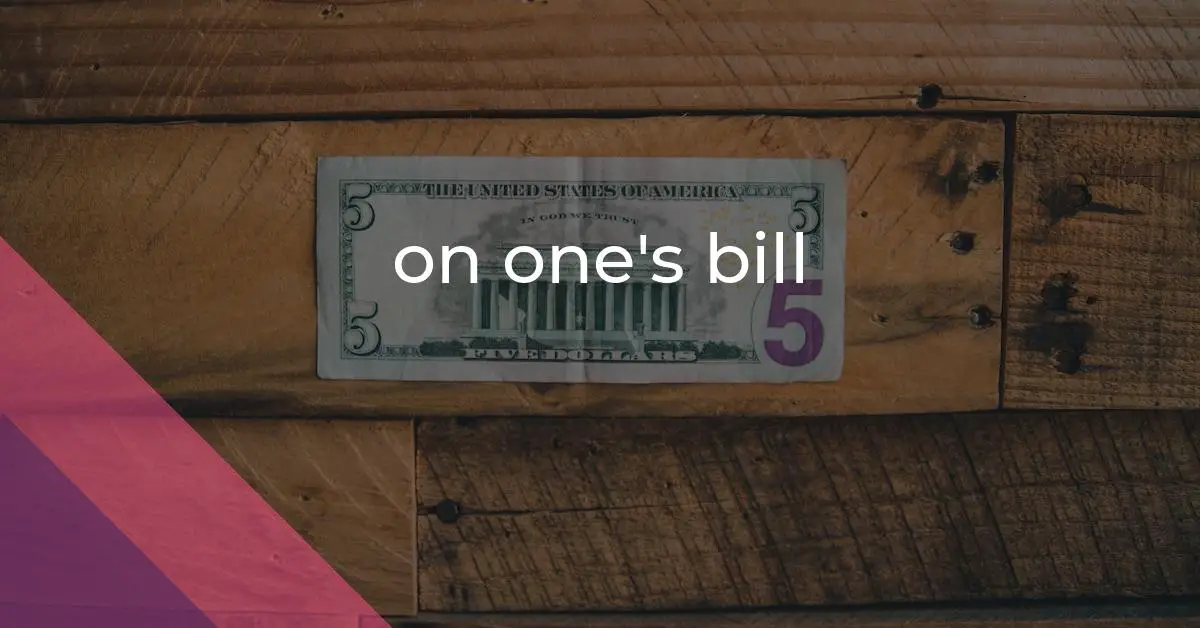on one’s bill: Idiom Meaning and Origin
What does ‘on one's bill’ mean?
The idiom "on one's bill" means to pay for something oneself, without any assistance or help from others.

Idiom Explorer
The idiom "under one's own steam" means to do something without any assistance or support from others.
The idiom "pay the bills" means to take care of one's financial responsibilities or obligations.
The idiom "on the spot" means to do something immediately or to be put in a situation where one is required to perform or make a decision without any preparation or advance notice.
The idiom "on the money" means to be exactly correct or accurate.
The idiom "on the cuff" means to get something, like goods or services, without paying for it immediately, usually with the intention of paying later.
The idiom "on the clock" means being paid for the time spent working. It implies that a person is actively engaged in their job responsibilities and under the time constraint of their employer.
The idiom "on its merits" means to evaluate something based solely on its qualities or performance, without considering any other factors or biases.
The idiom "on demand" means something that is available or provided immediately when requested or desired.
The idiom "on board" means to agree with or support an idea, plan, or decision.
Unveiling the Origin
The idiom "on one's bill" is commonly used in English to describe an action or responsibility that is undertaken by an individual alone, without assistance or support from others. The origin and history of this idiom can be traced back to its literal meaning and usage. The word "bill" in this context is derived from the Middle English word "bille," which referred to a formal document or written record of an obligation. Over time, the meaning of "bill" expanded to include a statement of charges or dues, as seen in phrases such as "restaurant bill" or "medical bill."
"On one's bill" gained popularity in the 19th century, particularly in British English. It was often used to describe someone who paid for a meal or other expenses without sharing the cost with others, emphasizing personal responsibility and independence. Today, the idiom "on one's bill" is commonly used in various contexts, both literal and figurative.
In a literal sense, "on one's bill" can refer to someone taking sole responsibility for a task, project, or problem. For example, if a person tackles a difficult assignment without any assistance, they can be said to have completed it "on their own bill." This highlights their ability to accomplish the task independently, showing self-reliance and personal determination.
"On one's bill" can also be used metaphorically to express a sense of loneliness or isolation, suggesting that an individual is acting independently, without the aid or support of others. This usage conveys a feeling of self-reliance or a desire for solitude. Similar to the phrase "pay the bills," "on one's bill" signifies being solely responsible for one's own needs and actions.
An additional related idiom is "on someone's account." This phrase emphasizes the idea of taking responsibility for someone else's actions or expenses. It can be used to describe a situation where one person is acting on behalf of another or assuming responsibility for their actions. For example, if you offer to pay for someone's dinner, you are doing so "on their account." This shows your willingness to take the financial burden on yourself, helping them out in a time of need.
"On someone's account" can also be used metaphorically to describe a situation where one person is affected by the actions or choices of another. For instance, if someone close to you is having financial difficulties, you may feel the impact "on your account," both emotionally and potentially financially. This phrase highlights the connection and shared responsibility that exists between individuals.
Like many idioms, the meaning of "on one's bill" is relatively straightforward, but its usage can vary depending on the context and the speaker's intention. It is important to consider the surrounding words and circumstances to fully grasp the intended meaning. By adhering to AP style and following the rules of clarity, simplicity, and varied language, an article about "on one's bill" can be edited to improve readability and effectiveness. By incorporating information about how "on one's bill" is related to idioms such as "pay the bills" and "on someone's account," the article can provide a comprehensive understanding of the phrase and its implications in various situations.
The idiom "on one's bill" captures the concept of personal responsibility and self-reliance. Whether used literally or figuratively, this idiom continues to be a part of the English language, enriching our expressions and adding subtle layers of meaning.
Example usage
Examples of how the idiom on one's bill can be used in sentences:
- After a long day at work, I enjoyed a quiet dinner on my bill at a cozy restaurant.
- The company retreat included an all-expenses-paid trip, so I didn't have to pay for anything out of pocket. It was a great opportunity to relax and unwind on the company's bill.
- Since my car broke down, I've been relying on public transportation and taking taxis, so all those fares are on my bill.
More "Payment" idioms



